|
Purim Rabbi
A Purim Rabbi of Purim Rav ( he, רב פורים; Rav Purim) is a mock rabbi appointed during the celebration of Purim to recite the Purim Torah and to perform other mock cermons. The Purim Rabbi is not necessarily to be a real rabbi. The tradition of Purim Rabbi is a widespread parody in Ashkenazi yeshivot, ulpanot and other schools with religious education. History The tradition of Purim Rabbi has been common for may centuries in yeshivot of Spain, Italy, France, and Germany, from where it was transferred to Poland as well. The modern tradition of Purim Rabbi in yeshivot is attributed to Volozhin Yeshiva; it is said that Rosh yeshiva appointed there one every year, and Purim Rabbi would satirize the yeshiva life and administration. It is said that Rav Kook was selected to serve as "Purim gabbai" of Volozhin Yeshiva and he recited humorous verses poking fun at yeshiva events and administration. He did so in Hebrew and Aramaic. One of his famous quips is " Berlin will sink an ... [...More Info...] [...Related Items...] OR: [Wikipedia] [Google] [Baidu] |
Berlin Haskalah
The ''Haskalah'', often termed Jewish Enlightenment ( he, השכלה; literally, "wisdom", "erudition" or "education"), was an intellectual movement among the Jews of Central Europe, Central and Eastern Europe, with a certain influence on those in Western Europe and the Muslim world. It arose as a defined ideological worldview during the 1770s, and its last stage ended around 1881, with the rise of Autoemancipation, Jewish nationalism. The ''Haskalah'' pursued two complementary aims. It sought to preserve the Jews as a separate, unique collective, and it pursued a set of projects of cultural and moral renewal, including a revival of Hebrew for use in secular life, which resulted in an increase in Hebrew language, Hebrew found in print. Concurrently, it strove for an optimal integration in surrounding societies. Practitioners promoted the study of exogenous culture, style, and vernacular, and the adoption of modern values. At the same time, economic production, and the taking up ... [...More Info...] [...Related Items...] OR: [Wikipedia] [Google] [Baidu] |
Hazzan
A ''hazzan'' (; , lit. Hazan) or ''chazzan'' ( he, חַזָּן , plural ; Yiddish ''khazn''; Ladino ''Hasan'') is a Jewish musician or precentor trained in the vocal arts who helps lead the congregation in songful prayer. In English, this prayer leader is often referred to as a cantor, a term also used in Christianity. ''Sh'liaḥ tzibbur'' and the evolution of the hazzan The person leading the congregation in public prayers is called the '' sh'liaḥ tzibbur'' (Hebrew for "emissary of the congregation"). Jewish law restricts this role to adult Jews; among Orthodox Jews, it is restricted to males. In theory, any lay person can be a ''sh'liaḥ tzibbur''; many synagogue-attending Jews will serve in this role from time to time, especially on weekdays or when having a Yartzeit. Someone with good Hebrew pronunciation is preferred. In practice, in synagogues without an official Hazzan, those with the best voice and the most knowledge of the prayers serve most often. As publi ... [...More Info...] [...Related Items...] OR: [Wikipedia] [Google] [Baidu] |
Qahal
The ''qahal'' ( he, קהל) was a theocratic organizational structure in ancient Israelite society according to the Hebrew Bible. See column345-6 The Ashkenazi Jewish system of a self-governing community or kehila from medieval Christian Europe (France, Germany, Italy) was later adopted further east by the Polish–Lithuanian Commonwealth (16th–18th centuries) and its successors, with an elected council of laymen, the kahal, at the helm of each kehila. This institution was exported also further to the east as Jewish settlement advanced. In Poland it was abolished in 1822, and in most of the Russian Empire in 1844. Etymology and meaning The Hebrew word ''qahal'', which is a close etymological relation of the name of ''Qoheleth'' (Ecclesiastes), comes from a root meaning "convoked roup; its Arabic cognate, ''qāla'', means ''to speak''. Where the Masoretic Text uses the term ''qahal'', the Septuagint usually uses the Koine Greek term ''ekklesia'', , which means "summoned grou ... [...More Info...] [...Related Items...] OR: [Wikipedia] [Google] [Baidu] |
Book Of Esther
The Book of Esther ( he, מְגִלַּת אֶסְתֵּר, Megillat Esther), also known in Hebrew language, Hebrew as "the Scroll" ("the wikt:מגילה, Megillah"), is a book in the third section (, "Writings") of the Judaism, Jewish ''Tanakh'' (the Hebrew Bible). It is one of the five Scrolls () in the Hebrew Bible and later became part of the Christian Old Testament. The book relates the story of a Israelites, Hebrew woman in Achaemenid Empire, Persia, born as Hadassah but known as Esther, who becomes queen of Persia and thwarts a genocide of her people. The story forms the core of the Jewish festival of Purim, during which it is read aloud twice: once in the evening and again the following morning. The books of Esther and Song of Songs are the only books in the Hebrew Bible that do not mention God in Judaism, God. Setting and structure Setting The biblical Book of Esther is set in the Persian Capital city, capital of Susa (''Shushan'') in the third year of the reign ... [...More Info...] [...Related Items...] OR: [Wikipedia] [Google] [Baidu] |
Makor Rishon
''Makor Rishon'' ( he, מָקוֹר רִאשׁוֹן lit. "Firsthand Source") is a semi-major Israeli newspaper associated with Religious Zionism and the conservative right-wing. History ''Makor Rishon'' was founded as a weekly magazine in July 1997 in order to create an independent newspaper with a Jewish religious and nationalistic slant. The paper was the brainchild of its original owner, Rabbi Shmuel Tal. The Listenberg family, a National Religious family in the diamond business based in Belgium and Tel Aviv financed the founding of the newspaper. Journalist Meir Uziel was hired to recruit the staff. Uziel enlisted Michael Ruzulio to find writers. Ruzulio had served as a reporter for ''Yedioth Ahronoth'' as well as for the Second Authority for Television and Radio, and helped create the “Voice of the Red Sea” radio station. The newsroom was established in the “Pirsum Yisrael” offices located in Givat Shaul in Jerusalem and included religious and secular journalist ... [...More Info...] [...Related Items...] OR: [Wikipedia] [Google] [Baidu] |
Yona Metzger
Yona Metzger ( he, יונה מצגר; born 1953) is an Israeli Orthodox rabbi and the former Ashkenazi Chief Rabbi of Israel. In 2013, while chief rabbi, a fraud investigation was opened. Metzger later pleaded guilty to a number of corruption charges, was tried and convicted, and after a plea bargain was rejected, served prison time. Early life Metzger was born in Haifa in 1953. He served in the Israel Defense Forces as a chaplain in the 7th Armored Brigade, and was discharged with the rank of captain. Metzger received his ordination from the Yeshivat Kerem BeYavne hesder yeshiva before working as a religious teacher. He served as rabbi of the Tiferet Zvi Synagogue in Tel Aviv, and was later appointed regional rabbi of northern Tel Aviv. Metzger has written ten books, two of which were awarded prizes by the President of Israel. While Metzger is from a national religious family and educational background, he had been closely identified with Haredi Judaism, and often sought the ... [...More Info...] [...Related Items...] OR: [Wikipedia] [Google] [Baidu] |
Ovadia Yosef
Ovadia Yosef ( he, , Ovadya Yosef, ; September 24, 1920 – October 7, 2013) was an Iraqi-born Talmudic scholar, a posek, the Sephardi Chief Rabbi of Israel from 1973 to 1983, and a founder and long-time spiritual leader of Israel's ultra-Orthodox Shas party. Yosef's responsa were highly regarded within Haredi circles, particularly among Mizrahi communities, among whom he was regarded as "the most important living halakhic authority". Biography Early life Yosef was born in Baghdad, Ottoman Iraq, to Yaakov Ben Ovadia and his wife, Gorgia. In 1924, when he was four years old, he immigrated to Jerusalem, Mandatory Palestine, with his family. In Palestine, the family adopted the surname "Ovadia". Later in life, Ovadia Yosef changed his surname to be his middle name, "Yosef", to avoid the confusion of being called "Ovadia Ovadia". The family settled in the Beit Yisrael neighborhood of Jerusalem, where Yaakov operated a grocery store. The family was poor, and Yosef was forced to wo ... [...More Info...] [...Related Items...] OR: [Wikipedia] [Google] [Baidu] |
Chief Rabbi Of Israel
The Chief Rabbinate of Israel ( he, הָרַבָּנוּת הָרָאשִׁית לְיִשְׂרָאֵל, ''Ha-Rabbanut Ha-Rashit Li-Yisra'el'') is recognized by law as the supreme rabbinic authority for Judaism in Israel. The Chief Rabbinate Council assists the two Chief Rabbis, who alternate in its presidency. It has legal and administrative authority to organize religious arrangements for Israel's Jews. It also responds to halakhic questions submitted by Jewish public bodies in the Diaspora. The Council sets, guides, and supervises agencies within its authority. The Chief Rabbinate of Israel consists of two Chief Rabbis: an Ashkenazi rabbi, and a Sephardi rabbi; the latter also is known as the Rishon leZion. The Chief Rabbis are elected for 10-year terms. The present Sephardi Chief Rabbi is Yitzhak Yosef, and the Ashkenazi Chief Rabbi is David Lau, both of whom began their terms in 2013. The Rabbinate has jurisdiction over many aspects of Jewish life in Israel. Its jurisdicti ... [...More Info...] [...Related Items...] OR: [Wikipedia] [Google] [Baidu] |
Sephardi
Sephardic (or Sephardi) Jews (, ; lad, Djudíos Sefardíes), also ''Sepharadim'' , Modern Hebrew: ''Sfaradim'', Tiberian Hebrew, Tiberian: Səp̄āraddîm, also , ''Ye'hude Sepharad'', lit. "The Jews of Spain", es, Judíos sefardíes (or ), pt, Judeus sefarditas or Hispanic Jews, are a Jewish diaspora population associated with the Iberian Peninsula. The term, which is derived from the Hebrew ''Sepharad'' (), can also refer to the Mizrahi Jews of Western Asia and North Africa, who were also influenced by Sephardic law and customs. Many Iberian Jewish exiles also later sought refuge in Mizrahi Jewish communities, resulting in integration with those communities. The Jewish communities of the Iberian Peninsula prospered for centuries under the Muslim reign of Al-Andalus following the Umayyad conquest of Hispania, but their fortunes began to decline with the Christians, Christian ''Reconquista'' campaign to retake Spain. In 1492, the Alhambra Decree by the Catholic Monarchs of ... [...More Info...] [...Related Items...] OR: [Wikipedia] [Google] [Baidu] |
Chaim Of Volozhin
Chaim of Volozhin (also known as Chaim ben Yitzchok of Volozhin or Chaim Ickovits; January 21, 1749 – June 14, 1821)Jewish Encyclopedia Bibliography: Fuenn, Keneset Yisrael, pp. 347–349; idem, Kiryah Ne'emanah, pp. 156–158; Lewin, Aliyyot Eliyahu (ed. Stettin), p. 70; Schechter, Studies in Judaism, p. 85, Philadelphia, 1896; Jatzkan, Rabbenu Eliyah mi-Wilna, pp. 100–106, St. Petersburg, 1901; Ha-Shahar, vi. 96; Eliezer of Botoshan, Kin'at Soferim, p. 796; Ahiasaf, 5654, p. 260, and 5699, p. 81; Reines, Ozar ha-Sifrut, iii.; Ha-Kerem, 1887, pp. 179–181; David Tebele, Bet Dawid, Preface, Warsaw, 1854; Maginne Erez, Preface, Shklov, 1803; Zedner, Cat. Hebr. Books Brit. Mus. pp. 179, 555.S was a rabbi, Talmudist, and ethicist. Popularly known as "Reb Chaim Volozhiner" or simply as "Reb Chaim", he was born in Volozhin (a.k.a. Vałožyn or Valozhyn) when it was a part of the Polish–Lithuanian Commonwealth. He died there wh ... [...More Info...] [...Related Items...] OR: [Wikipedia] [Google] [Baidu] |
Naftali Zvi Yehuda Berlin
Naftali Zvi Yehuda Berlin (20 November 1816 in Mir, Russia – 10 August 1893 in Warsaw, Poland), also known as Reb Hirsch Leib Berlin, and commonly known by the acronym Netziv, was an Orthodox rabbi, ''Rosh yeshiva'' (dean) of the Volozhin Yeshiva and author of several works of rabbinic literature in Lithuania. Family Berlin was born in Mir, today in Belarus, in 1816 into a family of Jewish scholars renowned for its Talmudic scholarship. His father Jacob, while not a rabbi, was a Talmudic scholar descendant of a German rabbinic family; his mother was directly descended from Rabbi Meir Eisenstadt. According to some sources such as his nephew the torah temima (reb baruch halaivy epstien), Berlin initially was a weak student. Legend has it that he applied himself to his studies after overhearing his parents debating whether he should pursue a trade. His first wife was the daughter of Rabbi Yitzchok of Volozhin, the son of Rabbi Chaim Volozhin. His second wife was his niece, a ... [...More Info...] [...Related Items...] OR: [Wikipedia] [Google] [Baidu] |





